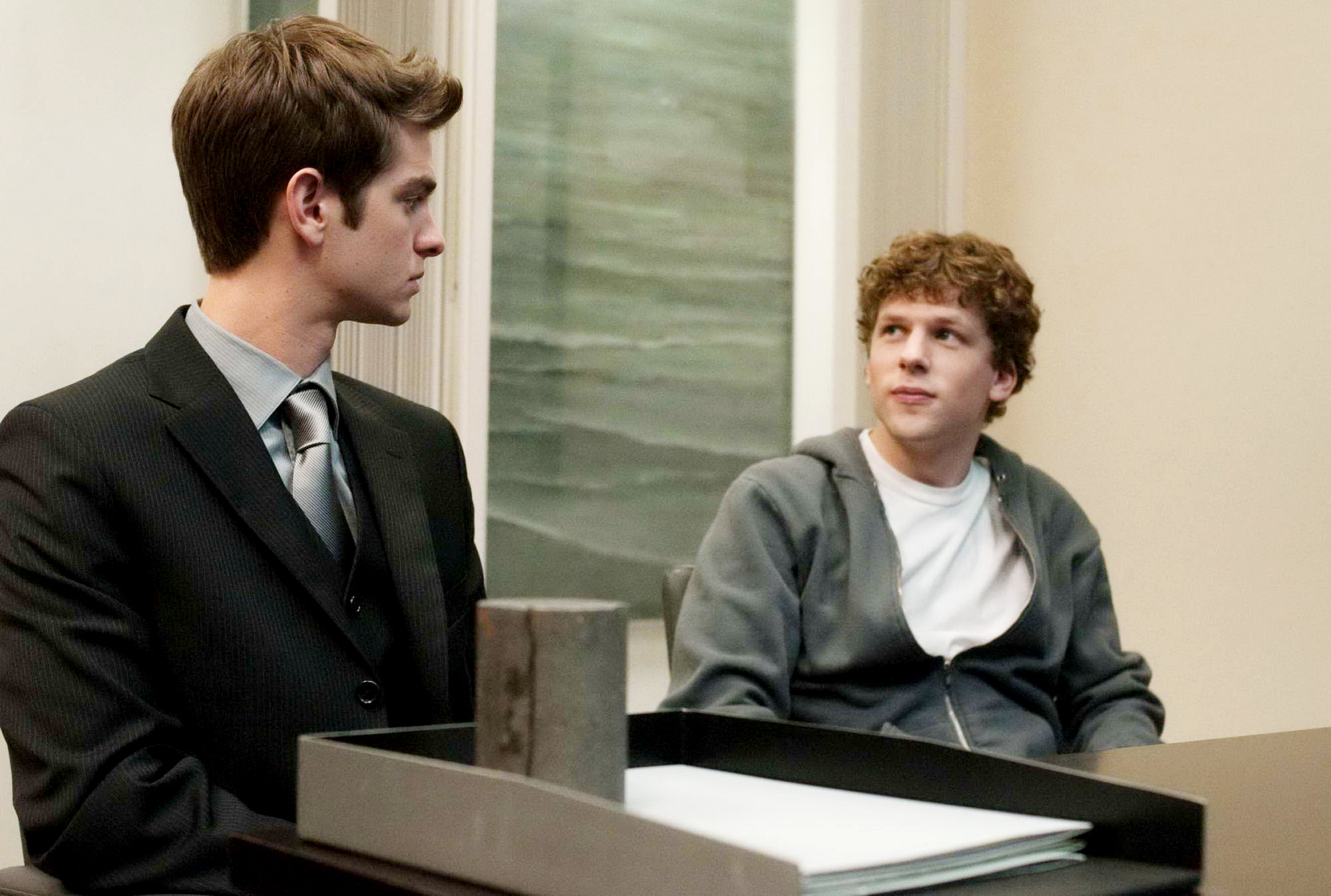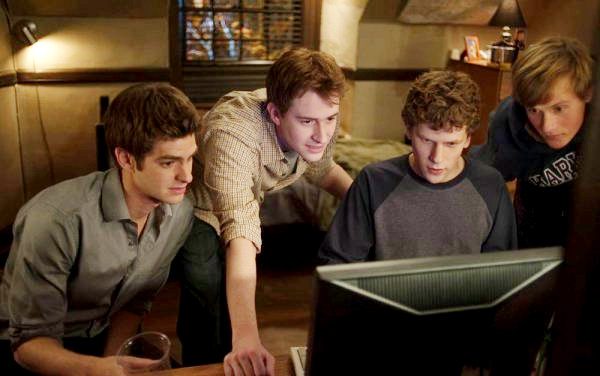
As the post-Inception zeitgeist film of the fall, David Fincher’s moody, ambitious, and entertaining The Social Network, a.k.a. the story of Mark Zuckerberg and the founding of Facebook, has already been pretty well dissected by now — I wish I’d had time to get to this flick earlier.
Suffice to say, this movie is a lot like its protagonist — fast-talking, occasionally irritating, oftentimes more clever than it is smart, and ultimately endearing despite itself. In all honesty, The Social Network irked me quite a bit in the early going, but it also managed to win me back by the closing credits. The highest praise I can give Fincher’s film in the end is that I enjoyed it, would recommend it, and look forward to seeing it again, even despite the fact that, when it came to any aspect of the story I actually knew anything about, the movie was often aggravatingly, woefully wrong.
First, the story. The Social Network begins with a very Aaron Sorkin-y dispute at a bar between Erica, an attractive young BU co-ed (Rooney Mara, soon to be Fincher’s Lisabeth Salander), and Mark, her geeky-arrogant Harvard boyfriend (Jesse Eisenberg, here making a bold move to outflank his actorly nemesis, Michael Cera). For some reason, Mark is seriously sweating what Finals Club — a.k.a. the old-school, Harvard version of the fraternity scene — he might end up in, so much so that he eventually lets his disdain for his girlfriend slip out. (“Why do you keep saying I don’t need to study?” “You go to BU!“) And so Erica wisely walks out of the picture, leaving Mark stewing in the cauldron of feminine slight, status anxiety, and nerd-rage from which, presumably, world-conquering social websites are eventually born.
Having introduced Mr. Zuckerberg and his general unpleasantness, The Social Network proceeds to tell his story. How, after bad-mouthing Erica on his blog (First rule of blogging: Don’t drink and blog), he embarks on a plan of revenge against all of womanhood by coding up a Harvard “Hot or Not” knockoff called Facemash. How this stunt gains him both notoriety on campus and the attention of Tyler and Cameron Winklevoss (both Armie Hammer), a pair of Old Money, Olympian-class rowing twins — and members of the Porcellian! — who need a coder for their website idea, “The Harvard Connection.” And how Mark, along with his kind-hearted (and wealthier) best friend Eduardo (Andrew Garfield, the heart of the film), may or may not steal their idea to create his own social portal, “The Facebook”– which, as we all know, eventually leads to mo’ money, mo’ problems, as a wise man once put it.
This origin story is smoothly told throughout — remarkably so, in fact. The action cuts back and forth between the shenanigans taking place at Harvard and, eventually, Silicon Valley (Enter Justin Timberlake, playing an outsized, Faustian version of Napster’s Sean Parker) and, after the millions have been made, two grim depositions: Mark is being sued separately by Eduardo and the Winklevoss twins, who he memorably dubs the “Winklevi.” And throughout, it’s hard not to appreciate how relentlessly smart the movie is. In the early going, to establish Mark’s coding prowess, there’s even an admirable attempt to explain the basics of how he puts together Facesmash: “First up is Kirkland. They keep everything open and allow indexes in their Apache configuration, so a little WGET magic is all that’s necessary to download the entire Kirkland facebook. Kids’ stuff.”
So what’s the problem? Well, I’m not a coder by any means, and I definitely wasn’t present at the birth of Facebook. But I did go to Harvard, spent more than a few hours in the crew tanks, own and have rocked the Henley jacket, and have cooled my heels in the Porc’s bike room before. And when it comes to the alma mater, the film is severely off by at least three or four decades. The Harvard of The Social Network is pre-meritocratic — It looks right but feels totally wrong. Really, who cares about Finals Clubs anymore? Slate‘s Nathan Heller already eviscerated the movie on his front, and he’s absolutely right: “I recognized their Harvard, but only from Love Story and The Paper Chase, not my experience. To get the university this wrong in this movie is no small matter.”
And so a lot of the The Social Network just felt ludicrous to me. Early on, they try to portray a party at the Phoenix, one of the Finals Clubs (in my day, probably the most ethnically diverse and least douchey of them, to boot), as the very pinnacle of exclusivity, where the beautiful people party. In the film, attractive, revealingly-dressed women bus in from all over Boston to see if they can get past the rope line. In reality, parties at the Phoenix were…well, college frat parties. The very fact that I got drunk at them occasionally doesn’t speak highly of either their exclusivity or their beautifulness. In other words, Finals Clubs are kinda sad and desiccated these days. They were glorified frats, and nobody took them at all seriously — not even the private school kids who might have a vested interest in keeping up the old appearances.
That is just one example, but it happens over and over again in The Social Network. That aforementioned sinister-seeming bus of farmed-in party girls — well, Cambridge folk know that’s the “F**k Truck”, and it was just a bus route, no more, no less. I was a regular on it for months when dating a woman out in Wellesley. But it seems like Sorkin heard the nickname and went wild with it. There’s another scene where Eduardo and others are hazed about “the Statue of the Three Lies, and some frosh flubs it wildly. But the three lies are Firstyear 101. Everyone knows ’em, and there’s no way a kid, however wasted, would blank out like that. The whole scene just seems inserted in to show off Sorkin’s Harvard research.
And don’t get me started on the crew stuff. On one hand, it’s a real kick to see the sport get some props here — One scene, set to a Reznorized version of “Hall of the Mountain King”, even shows the Winklevi competing at Henley. (Not much love for coxswains, alas.) But then the Wonder Twins meet “His Royal Highness,” the Prince of Monaco (as a friend pointed out, it’s His Serene Highness.”) And, when said prince says it’s the closest race he’s seen in 30 years, Tyler replies: “[M]ile and a half races are more commonly won by a boat length or two.” Uh, no, races come to within a few seats, or even a few bowballs, all the time. And Henley is actually a 1.3 mile race, and one that rowers would normally talk about in meters — here, 2112 — in any case.
FWIW, this inattention to detail is a recurring problem I have with Aaron Sorkin’s output — The West Wing, a show which I know is much-beloved, also had more than its fair share of aggravating errors. (To take just one example, I remember President Martin Sheen complaining in the last episode about the Founders picking the cold month of January for inauguration day. They didn’t.) And in both The West Wing and here in The Social Network, every single character speaks in exactly the same hyper-clever, overwritten voice, and that over-writing, to my mind, generally tends to be fast and sloppy (Or, to be uncharitable about it, coked out.)
Are these quibbles? Well, maybe, but they add up, and I eventually thought the minor-but-accumulating errors of truth hamstrung the overall truthiness of the project. If Harvard isn’t actually a citadel reigned over by bluebloods and subdivided into all-important Finals Club fiefdoms (and it isn’t), then the Match Point-esque status anxiety driving Zuckerberg here isn’t at all convincing.
Or, to take another problem: At the time this story begins, in the fall of 2003, I was in New York and dating someone I’d met on Friendster. But you don’t get any sense from this story that Friendster, or MySpace, or even the Columbia Campus Network were already well-established by the time Facebook was concocted.
The point being, the entire movie is constructed as if Zuckerberg et al are fighting over this ground-breaking and wonderful new idea. But, as Larry Lessig pointed out in TNR: By 2003, the idea of a social network was really nothing new at all. The origin of Facebook is really a story about execution: As Lessig writes, “In interviews given after making the film, Sorkin boasts about his ignorance of the Internet. That ignorance shows.”
In an effort to make the Facebook idea seem unique, Sorkin & Fincher argue here that it’s the site’s exclusivity that makes it something altogether new. Really? I don’t buy that, particularly when the worries about exclusivity theoretically driving Zuckerberg here ring so false. Don’t get me wrong — I liked The Social Network, and I had a lot of fun watching it. But, while Fincher’s film may be a very entertaining whirlwind tour through the stately pleasure domes of Harvard and the Bay, it’s also aggravatingly lacking in veritas in ways both great and small. I’d friend The Social Network, sure, but unfortunately it’s not the all-time classic that the online hype suggested.


And in both The West Wing and here in The Social Network, every single character speaks in exactly the same hyper-clever, overwritten voice, and that over-writing, to my mind, generally tends to be fast and sloppy…
Interestingly, this is one of the things I like most about Sorkin’s writing – it feels like hearing my ADHD friends and I talking; all rapid-fire, pop-cult peppered insanity. I can relate to his characters because they sound like people I know more than just about any other writer I can think of.
Two words i can describe Mark, nerd and Einstein. In reality, this really happens in business world, wise people use nerd people to have money.